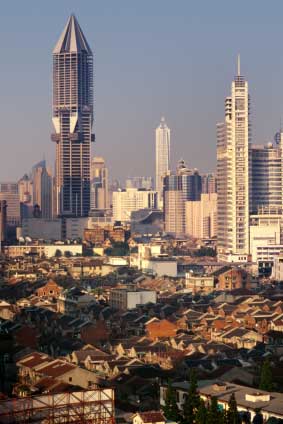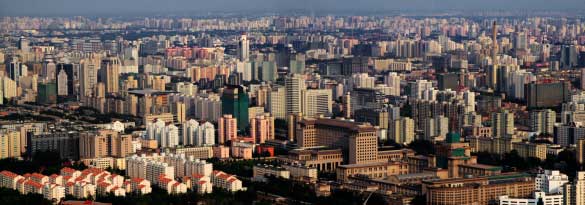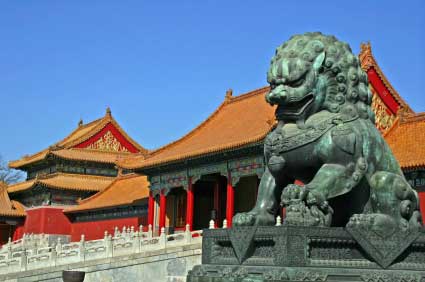Beijing, the capital of China, is also its second largest business centre. Within Beijing you will find a bustling and modern way of life coupled with a distinguished historical presence and many wondrous and ancient sights. Beijing recently had the honour of hosting the 2008 Olympic Games and thus the development of the city was hastened, which has only aided the vast progress made by this vibrant and exciting place.
The weather in Beijing is rather erratic, summer can be extremely hot and humid and winter brings with it strong winds and icy temperatures.

Employment, Work Permits and Visas
Generally, expats who move to Beijing do so via expat packages, perhaps from their existing employers or via outside recruitment. It is possible to travel to Beijing independently with the aim of securing work; however this will entail a lot more effort and could be very time consuming. The ability to speak Mandarin will prove to be invaluable if you find yourself scouring the Chinese job market; not being able to speak the language will effectively handicap you against the highly-skilled bilingual applicants probably applying for the same role.
To work in China you must first apply for a Z Visa (a work permit). To do this you will need to submit a valid passport with at least six months remaining, a completed ‘Q1’ application form, a passport size photograph, an ‘official visa notification’ (a notification issued by the Chinese government – your employer should get this for you) and either a ‘Work Permit for Aliens’ issued by the Chinese Labour Ministry Foreign Expert Bureau OR a ‘Foreign Experts License’ issued by the Chinese Foreign Expert Bureau. You will require both an original and a photocopy; your employer will be able to advise you on how to get these documents. The Z Visa is only valid for three months, so you must soon apply for a full residency and work permit from the local public security department.
Business Culture
The first thing to know about Chinese business culture is that they put great importance on good timekeeping; turning up late for a meeting will be considered rude. Formal greetings usually consist of an easy ‘hello and handshake’. Business cards are frequently exchanged and you should probably have yours printed in both English and Chinese. The giving of gifts is a powerful courteous gesture and is often done when you first make acquaintance with colleagues.
Chinese business principles hold great importance on healthy relationships being built up over time; this includes a strong emphasis on respect amongst colleagues and acquaintances. It is important that you maintain a high level of politeness, if you don’t you may offend some of your Chinese colleagues. Many elements of China’s culture come through in their business dealings so you should be aware of these practices to avoid any embarrassing or offensive faux pas. The Chinese place a lot of importance on hierarchy in the workplace, with senior workers shown the utmost respect at all times. You may be familiar with the small bow, or nod, that Chinese people use to greet each other; if you show that you are accustomed to tradition then your effort will be looked on very favourably. The Chinese also put a lot of weight on ‘saving face’. This means you should never be forcefully negative, or outwardly critical to ideas or suggestions as this could embarrass the recipient.
Accommodation
The streets and neighbourhoods of Beijing are all fairly well mixed between Chinese and expats. When it comes to finding somewhere to live, different areas will suit different people, with some being quiet and fairly remote, whilst places closer to the city and entertainment will often be smaller than their out-of-the-way counterparts. Using an estate agent is undoubtedly the best way to find your ideal location in Beijing. There two areas in Beijing that have become favoured by expats and these are Chaoyang and Shunyi.
Chaoyang is close to the city centre and is generally favoured by more outgoing expats. Shunyi is more suited to families, and has expat specific gated communities along with western shops and international schools. The downside of this location is the substantial commuter journey to most workplaces.

Transport
Beijing has a large public transport network with both buses and an underground train system; however they both have a tendency to become very crowded and uncomfortable especially during the commuter heavy times at rush hour. An alternative favoured by millions of commuters is cycling. Taxis are also an option but you will have to overcome some language barriers to ensure you arrive at your chosen destination, unless of course you learn Mandarin! Taxis can be found throughout the city and are never in short supply.
Healthcare
Beijing has a large amount of clinics and hospitals, but as the population of China continues to weigh down on its healthcare services it is advised that as an you expat you seek out an international health insurance package, either from your employer or independently. With this in mind should you experience any health problems your best bet will likely be the private facilities that are on offer, such as the International Medical Centre of Beijing. Here you will find English speaking doctors, many of whom may be expats themselves.
Education
If you are travelling with children then their best education will be found at the international schools. You will be able to find an international school that will offer your home country’s curriculum quite easily, or if wish for your child to study for an international baccalaureate then that will also be an option. The schools are generally located in areas known for expatriate housing such as Shunyi and come with the usual high international school fees. However, many of these schools will have high volumes of applicants so to ensure your child gets a place apply as much in advance as possible.
Entertainment and Lifestyle

Beijing is home to a lively nightlife scene, with a host of trendy nightclubs and karaoke bars littering the downtown districts. Most of these haunts are favoured by expats so if you do enjoy a late night boogie you could meet a few like-minded foreigners. Areas that have become known for their particularly lively nightlife include Sanlitun, Houhai and Wudaokou. Beijing is also famed for its acrobatic opera which incorporates a wide variety of styles including martial arts!
If you wish to engage in other activities during the day then as a newcomer to Beijing you will be spoilt for choice with sights and attractions. One of the biggest attractions will be the legendary Tiananmen Square, the ancient site of government buildings, and later of the infamous demonstrations. The Forbidden City is the largest complex of palaces in the world.
Beijing is famous for having some of the most varied dining establishments in the entire world, from home grown street vendors to international restaurants. The city centre plays host to many of these restaurants so you could enjoy a nice meal before a night at the bars.
The Chinese embassy for the UK can be found here: http://www.chinese-embassy.org.uk/eng/

